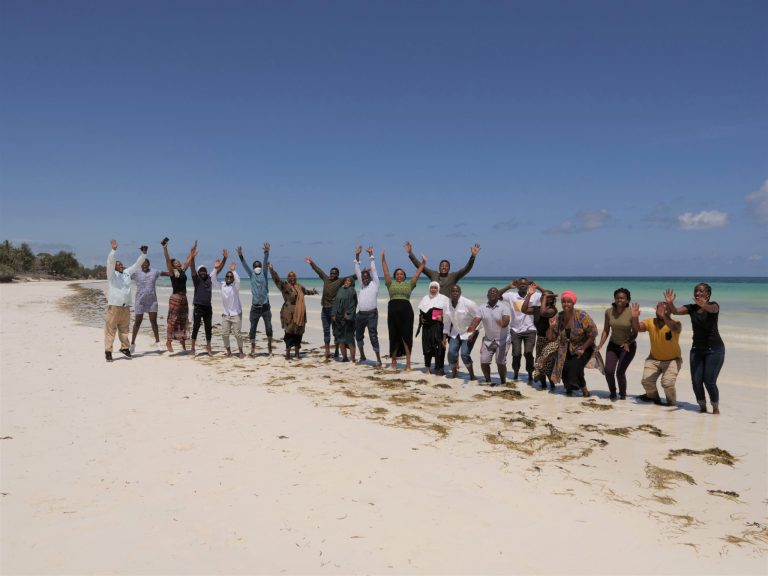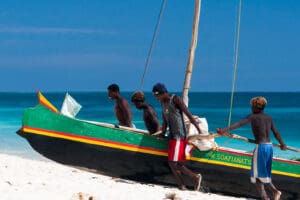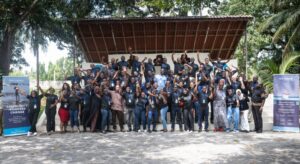Blue Ventures is celebrating the success of a landmark Somalia to Kenya fishers’ learning exchange, after welcoming representatives from three civil society organisations to Kenya’s south coast to discuss and see small-scale fisheries management and marine conservation in action.
The visit, hosted with Kenyan partners Coastal and Marine Resource Development (COMRED) and Maliasili, brought fishers from Somali conservation organisations Adeso, Secure Fisheries, and the Somali Greenpeace Foundation (SOGPA) to Kenya for a week-long learning to help inform and inspire local marine conservation efforts in the Somali region.
“The work you have done with communities is inspiring, and we look forward to doing the same with communities back in Somalia,” said Khadija Gaal, a programme coordinator with Adeso who travelled from Garowe, in Puntland state, to Kwale County in Kenya.
“Thanks Blue Ventures for giving us this valuable opportunity. It was a very useful learning visit where we learned more from these coastal communities about implementing co-management and livelihood development,” said Mohamed Ahmed Ali, a senior engineer at Adeso who came from Puntland for the visit.
“We were amazed at how organised these BMU and LMMAs were, and how they support the sustainable development of the fisheries sector and management of coastal resources and the aquatic environment. We will try to pass this useful knowledge onto Somali coastal communities,” he said.
Fisher learning exchanges are instrumental in helping coastal communities learn from existing marine and fisheries management initiatives. Across the Indian Ocean region they play a pivotal role in catalysing local marine conservation efforts. They often inspire new fisheries management initiatives.
“Our visitors were excited to be part of the trip, and said so repeatedly, and they were amazed at how much conservation is happening in Kenya, and how much communities have taken charge of conserving their own spaces,” said Randall Mabwa, Blue Ventures’ communications officer based in Mombasa.
The Somali coastline is the longest in continental Africa, stretching over 3,000 kilometres, and is home to diverse ecosystems and productive fisheries. However, a porous coastline and decades of insecurity pose serious challenges to developing and managing the region’s fisheries sector. Its extensive, diverse and carbon rich marine habitats − including coral reefs, seagrass beds and mangrove forests − remain largely unprotected and unmanaged.
“Conservation in Somalia has been nearly non-existent but we and other organisations are now working with communities to conserve our environment,” said Hassan Mowlid Yasin, Director of Somali Greenpeace Association.
Supporting small-scale fisheries management and conservation efforts on the Somali coast is fundamental to improving food security and income for coastal communities. The importance of the fisheries sector will only increase as the Somali region experiences longer and harsher droughts linked to climate change.
A lack of effective governance in Somalia has contributed to long standing problems of illegal unreported and unregulated fishing.
“We have a lot of illegal fishing in Somalia’s territorial waters and the lack of infrastructure makes it difficult for local fishers to gain the full potential benefit from fishing,” said Mohamed M. Abdullahi, senior project manager at Secure Fisheries in Garowe – Puntland.
Abdullahi also highlighted the problems of post harvest losses, low prices and inefficient value chains throughout the fishing sector, which see coastal fishers receiving a small fraction of the potential value of their catches.
The visit gave participants the opportunity to learn firsthand about fisheries management initiatives, and to share their knowledge and experiences through community discussions and visits to villages in the Shimoni-Vanga region.
“It is great to know what the organisations in Somalia are doing, especially considering that few people outside the country realise what’s happening in the Somali conservation space,” said Mabwa.
“Somalia is often overlooked when it comes to matters of marine conservation in the region, so this exchange opens up a conversation with the wider Western Indian Ocean. We hope the Somali marine conservation community can see how much opportunity there is across the Somali region for advancing conservation through partnership” he added.
In the southern Kenyan community of Vanga, members of communities that are part of the Vajiki forest association explained the process of restoring mangroves, from growing seedlings in nurseries to transplanting them to mangrove forests, and how their locally led project generates income from blue carbon credits. In nearby Shimoni, communities shared their experiences of seaweed farming for additional income and the process from harvesting raw material to marketing and selling. On Wasini island, a community-run coral restoration project in the no-take zone of a Locally Managed Marine Area showcased how local efforts can increase coral cover and fish breeding habitats.
“The most exciting part of the trip was our visitors seeing communities diversifying their livelihoods instead of just relying on fishing, by doing things like seaweed processing,” said Mabwa.
“So if our visitors go back with an understanding that coastal communities don’t have to rely on fisheries only, and that there is an opportunity for them to be creative and diversify their income, people can actually gain from other marine resources,” he said.
For two decades, Blue Ventures has been carrying out the simple yet transformative work of bringing together fishers and starting conversations that bring community-led change. Seeing is believing, and these learning exchanges have proven to be transformative in showing people what’s possible and inspiring change.
“This work empowers people on the ground to implement these projects and solutions,” said Mabwa.
“As opposed to us coming in and doing things ourselves, we are connecting local knowledge and expertise in managing small-scale fisheries,” he said.
“The biggest lesson for me, from having had many conversations with people on the trip, was that people get to take back knowledge about things that people are doing in Kenya that they could do for themselves back home.”
Watch our video news bite: https://vimeo.com/672415291/fbc19755e0


















